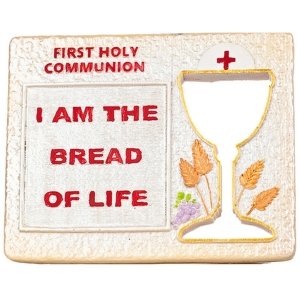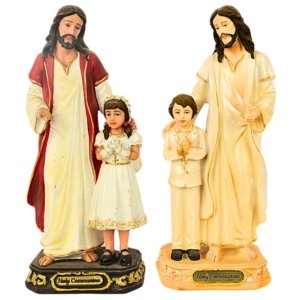The book of Revelation shows us Jesus as the Lamb slain in sacrifice yet standing upright. The perpetual offering of Christ in Heaven breaks through into our everyday life at every Mass. When we are present at Mass, we are privileged to join Him in his sacrifice of Calvary as he offers it to the Father now. Scripture tells us that the priestly office of Christ is unchanging and that his sacrifice is eternal (Hebrews 7).
In the gospel of St. John, Jesus proclaims Himself to be the bread of life.
With careful repetition, he further expounds on this teaching: He is the bread that came down from heaven; those who eat of him will not perish. The Hebrews conclude that these words of Christ are far removed from mere symbolism. The reaction of the majority was to murmur and cease following Christ from that point on. Jesus did not prevent them from leaving. Startlingly, He is keen to make it clear to his disciples that they are at a crossroads: they now have to make a choice. Will they leave Him too? Peter responds, “Lord, to whom shall we go? Thou hast the words of eternal life (John 6:68).” These words have resonated through time in the Christian tradition. The disciples stay with Jesus though they didn’t fully understand His teaching yet.
The disciples believed in the Lord because of the three years they had spent with Him. In this time, they had witnessed several miracles, from the quiet changing of water into wine at Cana to the far more public feeding of the five thousand. Pondering these events, Christian tradition, in the course of time, came to see in them a pre-figuring of the sacrifice of the mass.
In anticipation of Calvary, Jesus instituted the perpetual sacrifice of the mass at the supper he shared with his Disciples the night before. In the Upper Room, he ordained his apostles, priests of His sacrifice. His disciples would treasure Christ’s words, “THIS IS MY BODY” and “THIS IS MY BLOOD,” repeated in every Mass since. By giving His apostles, the priestly commission to perform this sacrifice henceforth, Christ shows us that the mystery of the Eucharist is inseparable from the mystery of the priesthood.
The Mass today is the same sacrifice at the one which played out at Calvary. The victim and the priest are the same. Christ is the victim being offered; Christ is also the priest who performs the offering. The sacrifice of the Mass differs from sacrifice at Calvary only in manner. St. Justin, a martyr who died in 165 AD records that for a long time, the ritual we know today as the Mass (in his days referred to as ‘the Breaking of the Bread’) was accompanied by scripture readings, a homily, and the ritual sharing of bread and wine by the congregation in the most reverent manner. Those who were well-off brought gifts for the poor. The centre of the mass has been, and always will be, the consecration of the Eucharist.
When we prepare Children for Holy Communion, we must be really thorough about it. They are going to receive God Himself. We must make them understand what a great privilege this is.
Previously, first holy communion was given to children between the ages 14-16 earlier. In 1910, Pope St. Pius X changed the age at which holy communion could be received to 7, provided the candidates were well prepared. In his younger days, Pope Pius X had been a parish priest, and later, a Bishop. During this time, he had enjoyed teaching the Catechism to young children. His experiences convinced him that younger children would appreciate the gift of the Holy Eucharist.
Every communion must be loving and very prayerful. Reciting prayers before and after Holy Communion can make it a more edifying experience. Reverence is an indispensable attitude while attending mass and receiving holy communion. If we don’t behave the way we believe (i.e. being reverent in the presence of the Lord), we will end up believing in the way we behave.
So, one must make an effort to go for a Sunday mass and help others to go too. As we reach the end of this extended meditation upon the Mass and the Eucharist, we would like to close with a note of caution. Receiving communion in a state of mortal sin is a sacrilege. While attending Sunday mass is mandatory for Catholics according to the laws of the Church, it is not compulsory that one must receive communion at every mass one attends. Let us remember that there is no shame in refraining from taking communion if we are not satisfied that we are properly disposed and in a state of grace.














Excellent commentary. If the holy images are of Infant Decor statues available with you, they are the most unique that I have ever seen.
We have a separate section totally dedicated for Holy Communion in our website. Just click the images and it will take you to the page. Thanks once again for your valuable feedback
Beautifully written
Merci monsieur
Excellent…
thanks a lot